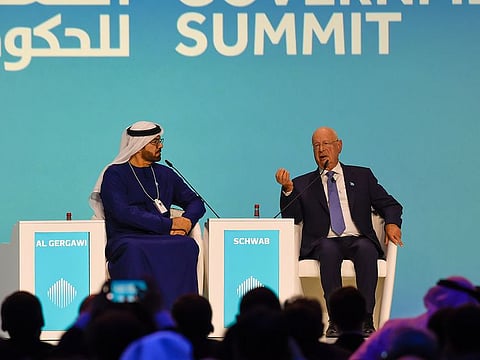WGS 2023: Multi-powers are competing for superpower status, says WEF chief Klaus Schwab
World seeing 3 catalytic transformations – energy, political, technological – Schwab says

The world is moving away from the era of a single superpower into one driven by a cluster of several multi-powers competing for superpower status, a top economist said at the World Government Summit (WGS) in Dubai on Monday.
“You have aspiring superpowers like India, rogue states and some technology and social media companies that have become superpowers. We are moving towards a more fragmented world, but hopefully not fractured,” said Klaus Schwab, founder of the World Economic Forum (WEF). Schwab said the formation of multiple powers is part of a political transformation the world is currently undergoing.
The economist explained that the world is presently seeing three catalytic transformations – energy, political, and technological.
Schwab said: “We have to re-globalise this world. We must make sure that we strengthen cooperation because, as mentioned by the UAE Minister of Cabinet Affairs Mohammad bin Abdullah Al Gergawi, we are faced with issues of existential importance for humankind. Our common future is at stake.”
The German economist spoke with Al Gergawi on the first day of the WGS summit, which sees WEF as a founding partner. Schwab praised the government of Dubai’s efforts in hosting the summit, an event that allows world leaders to reflect on the future and witness new developments in governance and science and technology.
Humanity in state of deep transformation
Schwab said that during the last WEF at Davos, a common concern raised by attendees revolved around humanity’s capability to cope with so many challenges simultaneously. However, he believes prevailing macroeconomic and geopolitical issues are not indicative of a crisis but a transformation.
“We are not in a state of multi-crises. However, we are caught in deep systematic transformation processes,” said Schwab. There is a difference between crisis and transformation. “After a crisis, you want to return to your point of origin as quickly as possible. However, in a transformation, you want to manage change and come out of it in a better situation than before,” stated Schwab. Commenting on the catalytic energy transformation, he said: “In 2050, the world would have 10 billion inhabitants, but it still needs energy, and we have at the same time to reach objectives of the Paris Agreement and decarbonise to reach zero carbon emissions or net zero,” stated Schwab.
Cost estimates of such a transformation to achieve energy requirements by 2050 are up to $3 trillion annually. “It is not the only factor for pushing this economic transformation. I think we should not underestimate the big reshaping of global supply chains, which is happening now,” he stated.
Technological transformations, however, are moving at an exponential pace. Artificial intelligence, Metaverse, near-space technologies, and synthetic biology will transform lives in 10 years. “Governments must be ambitious and seize this opportunity. My advice to government officials is to be on time to catch-up with these new technologies. This can be done by permanent upskilling and rescaling. Governments must also be resilient,” he added.
What’s next after the Fourth Industrial Revolution?
Schwab coined the concept of the ‘Fourth Industrial Revolution’ in his 2016 book. Commenting on what’s next after this revolution, Schwab said this phenomenon would stay relevant for the next 5-7 years at least.
However, the WEF chief also advised governments to create strict policies that ensure the government does not go into the hands of artificial intelligence.



